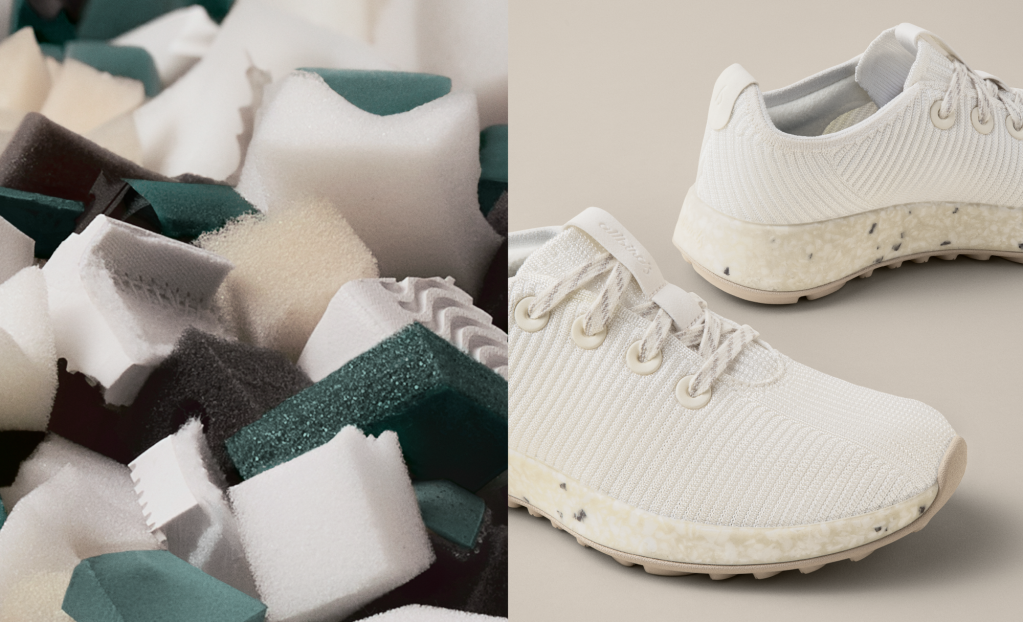Allbirds debuts waste-based shoes
The $140 sneakers are a shift for the natural fiber-focused brand. Read More

- The Remix runner marks an industry first: textile-to-textile recycled lyocell in a sneaker.
- Allbirds, which recently featured a “net zero shoe,” has built its brand on Merino wool and other natural virgin materials.
- A general tension between circularity aspirations and commercial realities remains a challenge.
In a footwear first, a new Allbirds’ sneaker features material that has been recycled from polycotton waste.
The Remix runners, which retail for $140, are made with lyocell recycled by startup Circ from used polycotton T-shirts and other textiles. The midsoles are recycled from manufacturing-scrap foam by partner Blumaka, and the laces are made of recycled polyester.
“We created Remix because it directly aligns with our central commitment: to make better things in a better way,” Allbirds CEO Joe Vernachio said of the 8,000-pair capsule collection. “That commitment demands that we not only look to materials of tomorrow, but also explore how we can make use of materials available today.”
The company has cemented its identity around the use of natural fibers — New Zealand Merino wool, eucalyptus and sugar cane — and unique forays into reducing footwear emissions: In February, Allbirds announced offset-free “net zero” Moonshot shoes that have a tiny carbon dioxide footprint of roughly 1 kilogram. It open-sourced the methodology, inviting copycats.
Until now, though, Allbirds’ circular practices have focused predominantly on a ReRun branded resale program rather than on recycled materials. So the Remix line is a shift for the company. It is the next step for the industry as well.
“This collaboration with Allbirds marks a major milestone in proving that textile-to-textile recycling can scale beyond apparel and into a high-performance category like footwear,” Circ CEO Peter Majeranowski said. “Footwear requires an entirely different level of durability, resilience and performance compared to apparel. Materials need to withstand repeated wear, flex and environmental stress. The challenge was ensuring that our recycled lyocell fibers could be spun, woven and finished into textiles that not only looked and felt premium, but also had the strength and stability required in a shoe upper.”
“Although we — and the footwear industry at large — have a ways to go to address the issue of manufacturing waste, Remix is a step in the right direction, and we’re proud of the progress it represents,” Vernachio said. “While we grapple with some of the complex questions around circularity and end-of-life, we’re sharply focused on keeping products in use.”
A challenging marketplace
Although countless Silicon Valley geeks — not to mention Barack Obama — have sported Allbirds’ understated, logo-less shoes, the brand has struggled with falling sales and stock prices since going public in 2021. At the time it dubbed itself “the first ‘sustainable’ IPO,” a statement it later retracted under SEC pressure.
Tim Brown and Joey Zwillinger founded the certified B Corporation in 2015 as a Kickstarter project with an anti-petroleum bent. One early exception to its otherwise natural-fiber lineup was the “Futurecraft.Footprint” shoe, a collaboration with Adidas that used 30 percent recycled polyester and 70 percent lyocell.
Currently, athletic shoes make up about 40 percent of the market for sustainable footwear, according to Fortune Business Insights.
Increasingly, sneaker designers are working to develop “circular” products from recyclable and biobased materials and with 3D printing. The demand for non-synthetic fibers in footwear — whether virgin or recycled — remains relatively niche. Natural fibers in apparel, footwear and industrial applications combined will expand from $69 billion last year to $95 billion in 2030, according to Grand View Research.
That’s dwarfed by the global market for recycled polyester sneakers, which is expected to expand from $465 million in 2023 to $958 million in 2034, according to Transparency Market Research.
North Carolina recycler Unifi dominates this space, providing its Repreve recycled polyester to Nike and numerous other footwear and fashion brands. However, Repreve derives from bottles, a controversial practice among advocates of closed-loop recycling. Unifi also recycles used polyester textiles into new material called Repreve Takeback, which features in Teva sandals.
“Giving brands more options for sustainable materials is a step towards overall sustainability,” said Cynthia Power, co-host of the Untangling Circularity podcast and a fashion industry consultant. “If they can plug these materials into their supply chains without raising costs significantly and continue to make their customers happy, we should expect to see more sustainable circular materials in footwear.”
















